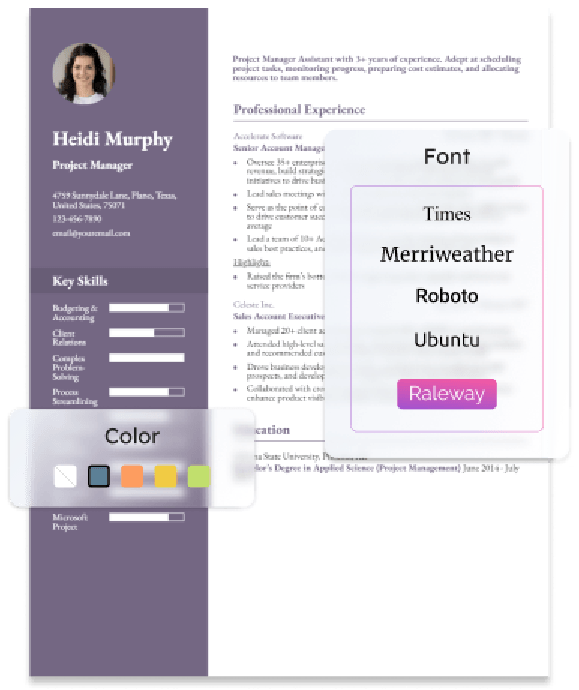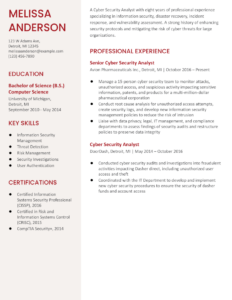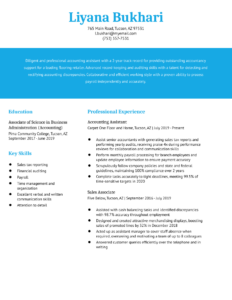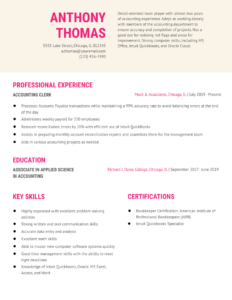How To Write an Entry-Level Resume
To write a good entry-level resume, you’ll need to show you can excel at the standard duties of your profession despite limited work experience. The tips and examples below will help you draft each section of your resume so it gets you interviews for a great entry-level opportunity.
- Entry-Level
- Mid-Level
- Senior-Level
1. Craft an outstanding profile with a summary of your entry-level qualifications
Your resume profile should catch hiring managers’ interest by giving the top reasons you’d succeed as a junior employee.
It’s usually best to write this section last so you can look over all your career information and decide what those top reasons are. For instance, maybe you recently finished a relevant degree program with honors. Or perhaps you have hands-on experience as a result of several internships. You might also give details on your volunteer or extracurricular activities if they relate to your career path. Gathering these highlights at the top of your resume shows hiring managers you’re ready to advance their business goals.
Profile Example
Engineering graduate with a strong knowledge base centered on robotics, biotechnology, nanotechnology, and artificial intelligence. Passionate about streamlining work processes and finding novel solutions to complex problems. Quickly adapt to new work challenges and conditions.
2. Showcase your entry-level experience
View the Experience section(s) as a chance to give examples of your success in carrying out the basic duties of your profession.
To generate these examples, outline any work, internship, volunteer, or extracurricular experience you have so far. Under each experience or position, brainstorm and jot down your primary duties and achievements first. Then, review your writing to find details about your target entry-level job. Emphasize these details on your resume, and leave out any details that don’t have relevance.
For instance, say you recently worked as an HR administrator. If the entry-level jobs you’re targeting focus on recruitment, emphasize that aspect of your HR administrator job. Spell out the various things you did to source and screen talented candidates, and hiring managers will see your skill set can serve their HR needs.
Note: if you have no relevant experience, you can still write a good entry-level resume. Focus on your education details instead — see the following section.
Internship Experience Example
Editorial Intern, Regional Floral Magazine, Lancaster, OH | May 2022 to August 2022
- Helped manage the magazine’s main email account, responding to feedback and providing subscription information as needed
- Answered and forwarded calls to the appropriate department
- Maintained and updated subscription rolls
- Organized meetings and verified sources for reporters
Professional Experience Example
HR Administrator, SFE Association, Boston, MA | October 2022 to present
- Help process payroll efficiently and accurately
- Assist recruiting operations by updating job descriptions, posting new jobs, screening applicants, and flagging and organizing standout resumes
Highlight:
- Praised on formal review for high accuracy maintaining (paper and digital) records of all personnel changes and performance assessments
3. List any education and certifications relevant to entry-level work
Use the Education and Certifications sections to show you have a solid knowledge base in your field.
For entry-level applicants, citing relevant awards, coursework, papers, or projects under each school degree is often a good idea. This helps hiring managers see you are capable even if your hands-on experience is limited (especially important if you recently finished a master’s or doctorate.) For the same reason, feel free to flesh out any relevant licenses or certifications with a description of the skills you learned and could apply at the entry level.
Below are templates and examples to help you format your education and certification details. Note that optional template areas appear in [brackets].
Education
Template
- Degree Name — [Major, Minor], School Name, City, ST | [Year]
- [Academic honors or awards]
- [Relevant coursework]
- [Dissertation]
- [Key projects]
Example
- Candidate: Bachelor of Arts (BA) – English, Creative Writing, Ohio University, Athens, OH | expected May 2023
- Winner, Campus Award for Long-Form Fiction (2022)
- Runner-up, Campus Award for Excellence in Poetry (2021)
- Select Coursework:
- Children’s fiction
- Fiction workshopping
- Poetry and drama
- Prose and nonfiction
- Short story writing
Certification
Template
- Certification Name or Title, [Awarding Organization] | [Year]
- [Description of training]
Example
- Service Excellence Certificate, VCU Advanced Solutions | 2023
4. List key entry-level skills and proficiencies
Add a Key Skills section to highlight the various ways you can apply yourself in your chosen profession.
This section is helpful for entry-level job seekers because it shows you have the core skills to work in your target job, even if you’ve never held that job before. The keywords you include will mostly depend on the role you’re after, but below are some broader work skills to consider adding.
| Key Skills and Proficiencies | |
|---|---|
| Cross-functional coordination | Customer service and relations |
| Efficiency improvement | Independent research |
| Leadership support | Microsoft Office Suite (Word, Excel, Outlook, PowerPoint) |
| Office administration | Policy implementation |
| Process redesign and improvement | Reporting and documentation |
| Task prioritization | Teamwork and collaboration |
| Time management | Writing, editing, and proofreading |
How To Pick the Best Entry-Level Resume Template
A clear and straightforward resume template is usually best for entry-level job seekers. Opt for a visual design that lets the hiring manager quickly review your best career details. Select a traditional resume font, and avoid any template with a colorful or elaborate design. Also, make sure the template is compatible with applicant tracking systems (ATS) employers use to screen resumes.
Entry-Level Text-Only Resume Templates and Examples
- Example #1
- Example #2
- Example #3
Hideo Araki
Boston, MA 12345 | (123) 456-7890 | [email protected] | www.linkedin.com/example
Profile
Personable HR Administrator with recent work experience at two nonprofits. Confident supporting all leadership levels. Skilled communicator who builds positive, productive relationships with diverse employee groups. Committed to professional integrity and excellence in all endeavors.
Key Skills
- Cross-functional collaboration
- Leadership support
- Microsoft Office (Word, Excel, Outlook, PowerPoint)
- Payroll disbursement and coordination
- Personnel recruiting
- Policy implementation
- Process improvement
- Reporting and documentation
Professional Experience
HR Administrator, SFE Association, Boston, MA | October 2022 to present
- Help process payroll efficiently and accurately
- Assist recruiting operations by updating job descriptions, posting new jobs, screening applicants, and flagging and organizing standout resumes
Highlight:
- Praised on formal review for high accuracy maintaining (paper and digital) records of all personnel changes and performance assessments
HR Intern, SCI Services, Boston, MA | August 2021 to September 2022
- Accurately implemented various HR policies and protocols
- Gained strong experience in standard Excel functions as well as advanced Word and PowerPoint formatting
Education
Associate Degree – Psychology, Bunker Hill Community College, Boston, MA | 2021
Frequently Asked Questions: Entry-Level Resume Examples and Advice
What are common action verbs for entry-level resumes?-
One of the best ways to enhance your resume is by starting each bullet point with a strong action verb. Dynamic verbs help you keep the hiring manager’s attention and show the impact of your experience. The following list can help you find a good mix of action verbs for your entry-level resume.
| Action Verbs | |
|---|---|
| Assisted | Collaborated |
| Coordinated | Created |
| Decreased | Delivered |
| Developed | Distributed |
| Documented | Edited |
| Enhanced | Established |
| Gathered | Generated |
| Grew | Helped |
| Implemented | Improved |
| Increased | Initiated |
| Introduced | Launched |
| Lowered | Managed |
| Partnered | Produced |
| Proofread | Provided |
| Raised | Reduced |
| Reinforced | Reported |
| Researched | Responded |
| Served | Spearheaded |
| Started | Streamlined |
| Strengthened | Supported |
| Worked | Wrote |
How do you align your entry-level resume with a job posting?-
The Bureau of Labor Statistics forecasts entry-level jobs will increase by about 5% between 2021 and 2031.
You can get more entry-level job interviews by tailoring your resume for each application. Start by looking at the job post and noting words or phrases that are repeated, emphasized, or otherwise seem important. Compare these phrases against the language you’re using in your resume, particularly the Profile and Key Skills sections. Then look for ways to align your resume language with the job post without copying text or misstating your background.
For example, if the company wants someone collaborative, you may want to call out that aspect of your experience in your Profile. Or say the company has many non-English speaking customers. Highlight your foreign language skills both in your profile and as a separate section farther down the document. With adjustments like these, you can make your resume more relevant to each job opportunity.
What is the best entry-level resume format? -
In nearly all cases, you should use a Combination (or Hybrid) resume because it’s easiest for hiring managers to learn about your pertinent skills and experience. It’s also easiest for you to align with your job goals.
With the Combination format, you highlight your most relevant skills and background in your Experience or Work History section and an intro. (This combination of work history and intro content is where the format gets its name.) Your resume intro should include a Profile summary and Key Skills section, but you may also add a Career Highlights or Awards section. By carefully choosing the details for these intro sections, you can (a) position yourself for your target job and (b) give hiring managers a clear, quick view of what you offer.
Craft your perfect resume in minutes
Get 2x more interviews with Resume Builder. Access Pro Plan features for a limited time!

To increase your chances of an interview, write and submit a strong cover letter. The key to an effective letter is customizing it based on each job opening. Read our Cover Letter Guide to learn how. See our Entry-Level Nurse and Entry-Level Counseling cover letter guides for related examples.







